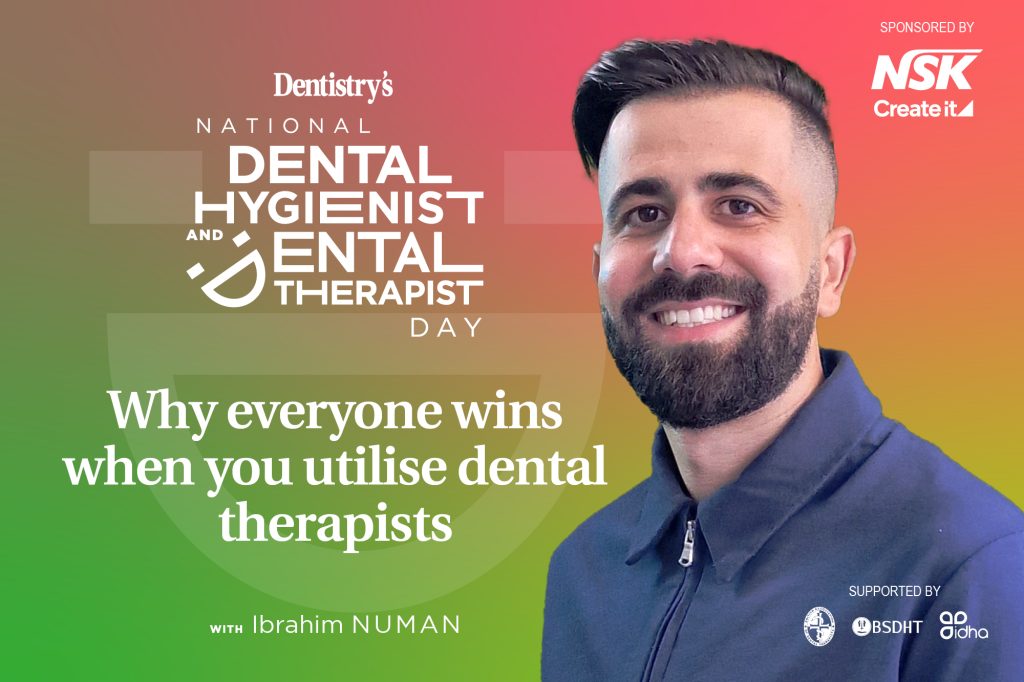
Ibrahim Numan discusses how underutilised dental therapists are impacting the industry and how to use them to their full scope of practice.
How big is the issue of dental therapists not being used to their full potential in the UK?
Huge! I’m very passionate about dental therapists being utilised in practice and it’s something I have been fighting for since graduating five years ago. But the truth is, people have been fighting for this cause since 1932.
The most important thing to note here is the significant difference in the way a dental therapist would be utilised in an NHS/mixed practice compared to private practice.
Earlier this year the Office for Health Improvement and Disparities (OHID) revealed that 47,581 people aged zero to 19 had a tooth extracted in hospital in 2022-2023. There were 31,165 tooth extractions with a primary diagnosis of tooth decay. Now, I am not suggesting dental therapy is the answer to NHS dentistry, but I do think we have a vital role.
Preventing tooth decay is what we do… we educate patients on plaque control, provide diet analysis and advice, diagnose caries, restore teeth, and extract primary teeth.
In August 2023 there were 5,558 UK registered dental therapists. If they were all used to their full potential, I wonder how different the numbers from OHID would look? (Of course, there are still many grey areas regarding prescriptions, pay, maternity leave and pensions for dental therapists working in the NHS).
How does this impact the practice, the dental therapists, and the patients?
When I started my dental nurse training in 2011, I was asked if I wanted to progress my dental career by a dental nurse to which I replied: ‘I’m interested in studying dental therapy.’ The reply I got was: ‘Why? You need to study for longer and you never do the therapy side of things anyway. You will get paid so much more as a private hygienist.’
Unfortunately, she was right… There’s a huge population of dental therapists who graduated and have only practiced as a hygienist which has resulted in them becoming deskilled and losing confidence. I think associations like the British Association of Dental Therapists (BADT) and private companies are doing a great job in running refresher courses in restorative and paediatric dentistry. However, there is still a long way to go, and I do believe more education and training could be provided.
Remuneration is still a problem, especially in an NHS setting, and I don’t think there is a ‘one size fits all’ protocol to follow here. This is because factors such as experience, practice location and patient base must be considered.
I work full time in private practice and on average I see 10-30 patients a month for the first time. Five years in, and patients are still perplexed when I introduce myself as a dental therapist. I’m optimistic that one day they will know what our role is and what we can offer dentistry.
How can dental practices use dental therapists to their full scope of practice?
It’s simple… start the conversation and speak to your dental therapist. Communication is key. Are they interested in paediatric dentistry, restorative dentistry, or cosmetic dentistry but don’t have the confidence? If that’s the case, what courses can you encourage them to go on to?
I have introduced dental therapy to many practices, and I think the fundamental thing is to ease someone in. I’ve heard stories from colleagues of showing up to work expecting a day of hygiene visits to find a day fully booked with examinations. Throwing a colleague in the deep end with no communication is just not fair.
Zoning the diary is also helpful. For example, 11am-1pm and 2-3pm are therapy zones when you can see patients for treatment.
Finally, the piece de resistance is a ‘mentor’. This doesn’t mean someone standing over your shoulder and watching your every move. In fact, it could be the opposite… is there a space in the diary where you can nurse for the dentist to see how they work? This allows you to meet the patient and work in a similar way, so patients feel comfortable. A mentor is a door you can knock on and get the support you need.
What benefits does this bring?
Time. The dentist gains time in their diary and you spend time doing what you love.
Everyone wins, including the patient.
Talk to patients about how everyone at the practice has a different interest and role, and you work as a multi-disciplinary team. ‘I am going to improve your oral health and sort out these fillings first then my colleague will place your crown’.
With thanks to our sponsor, NSK.
Celebrating National Dental Hygienist and Dental Therapist Day:
- Supportive care and maintenance of dental implants
- Happy National Dental Hygienist and Dental Therapist Day!
- The evolution of dental hygienists and dental therapists
- Implementing a therapy-led model in practice
- Empowering dental hygienists and dental therapists.
- Introducing National Dental Hygienist and Dental Therapist Day.
Follow Dentistry.co.uk on Instagram to keep up with all the latest dental news and trends.


